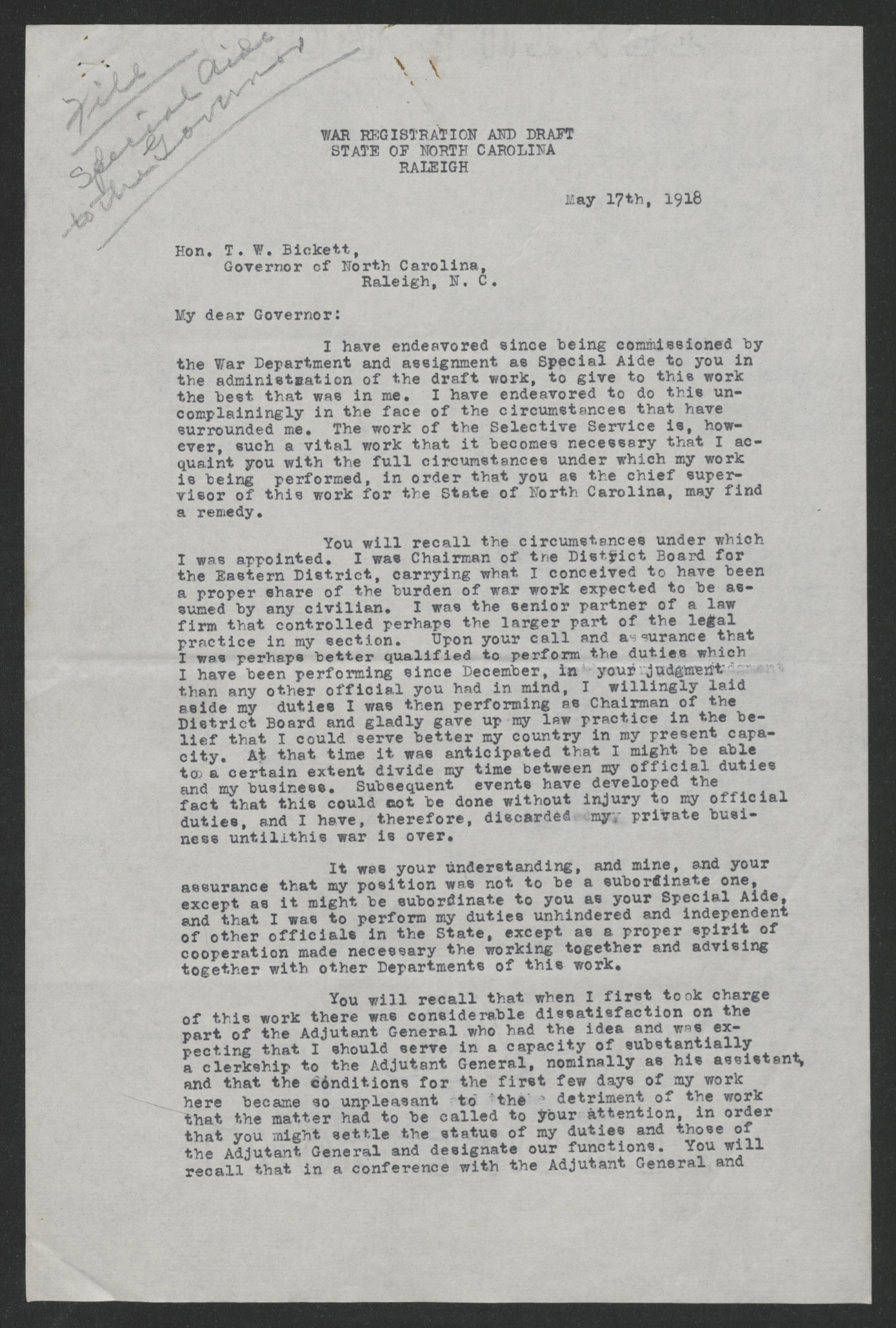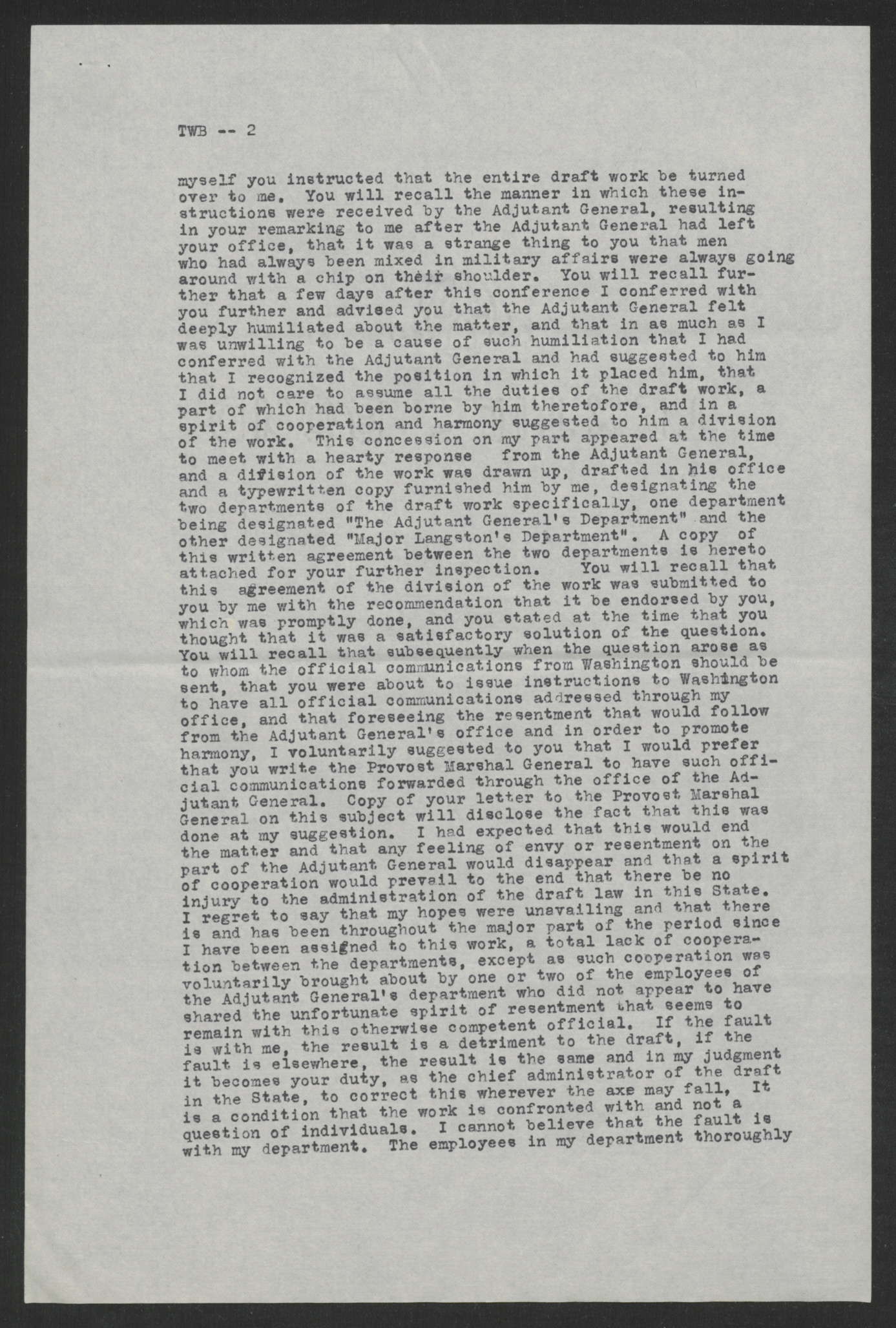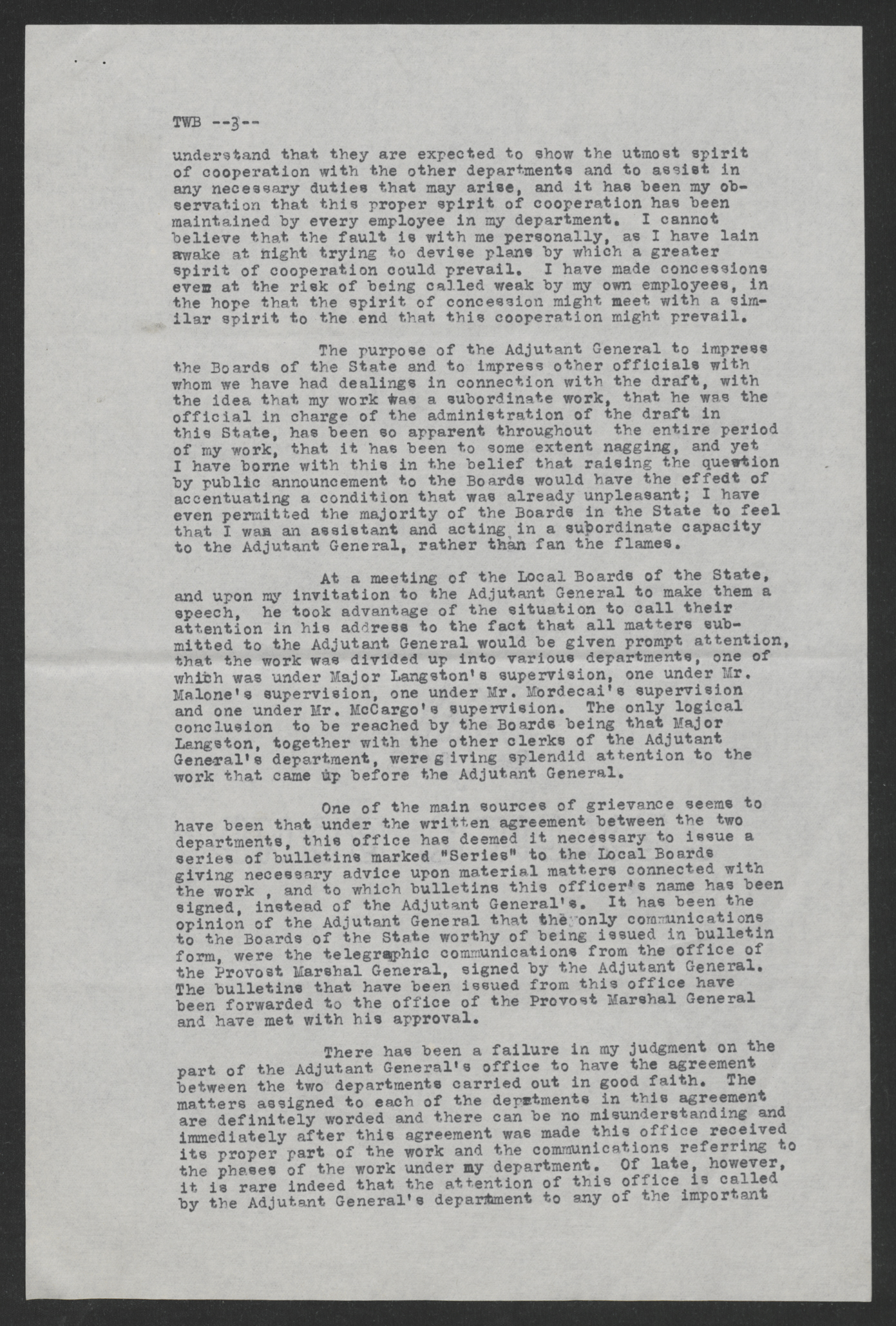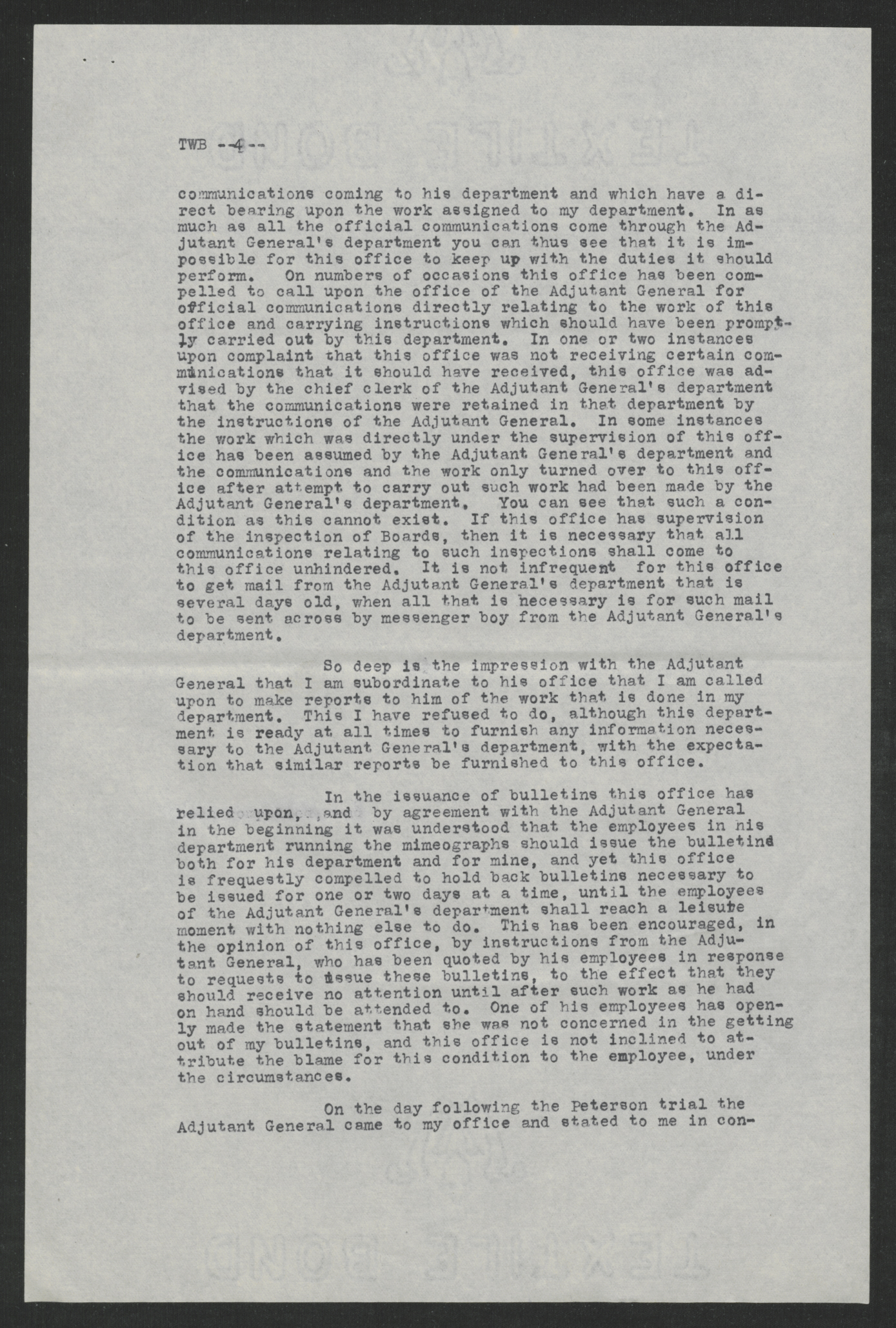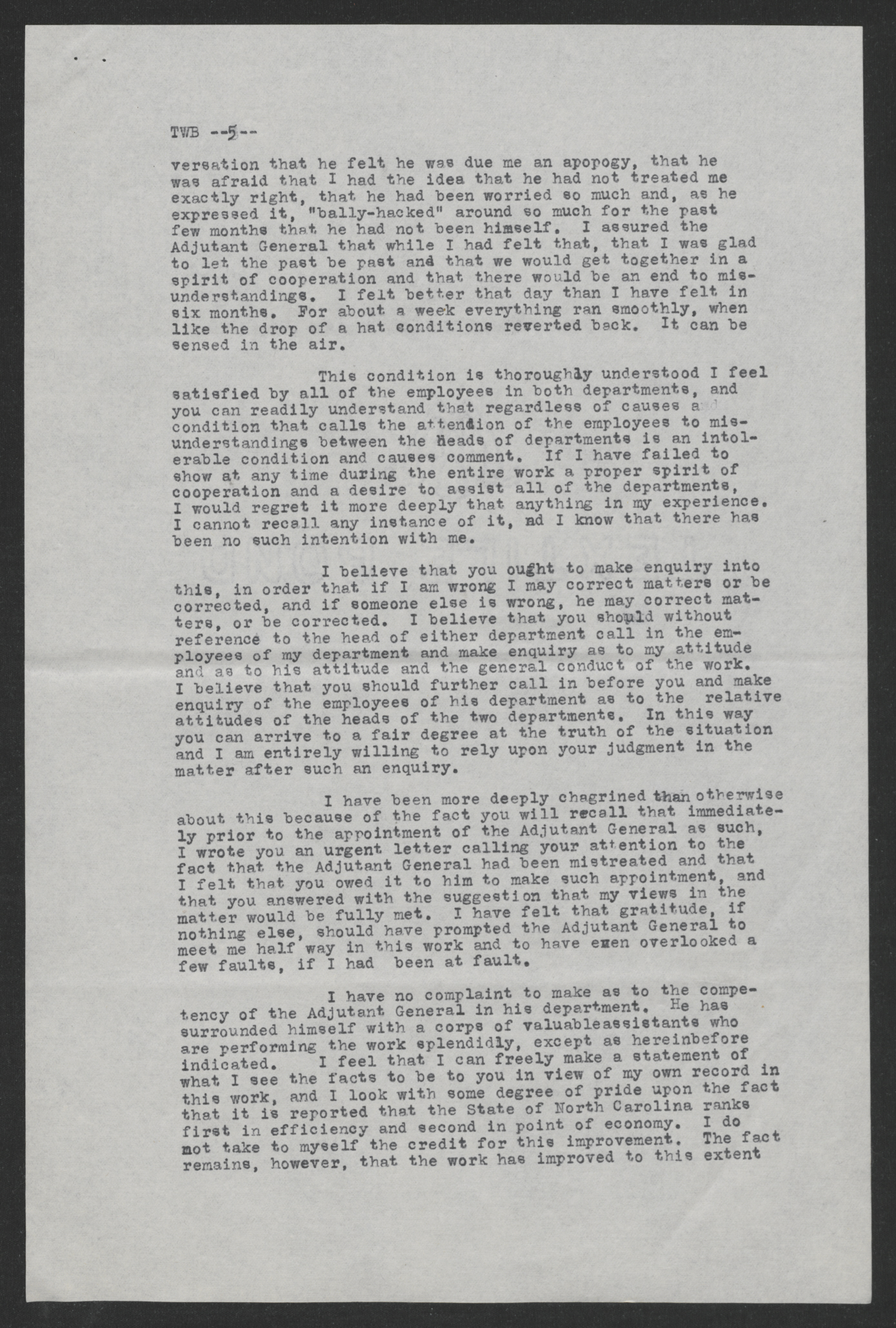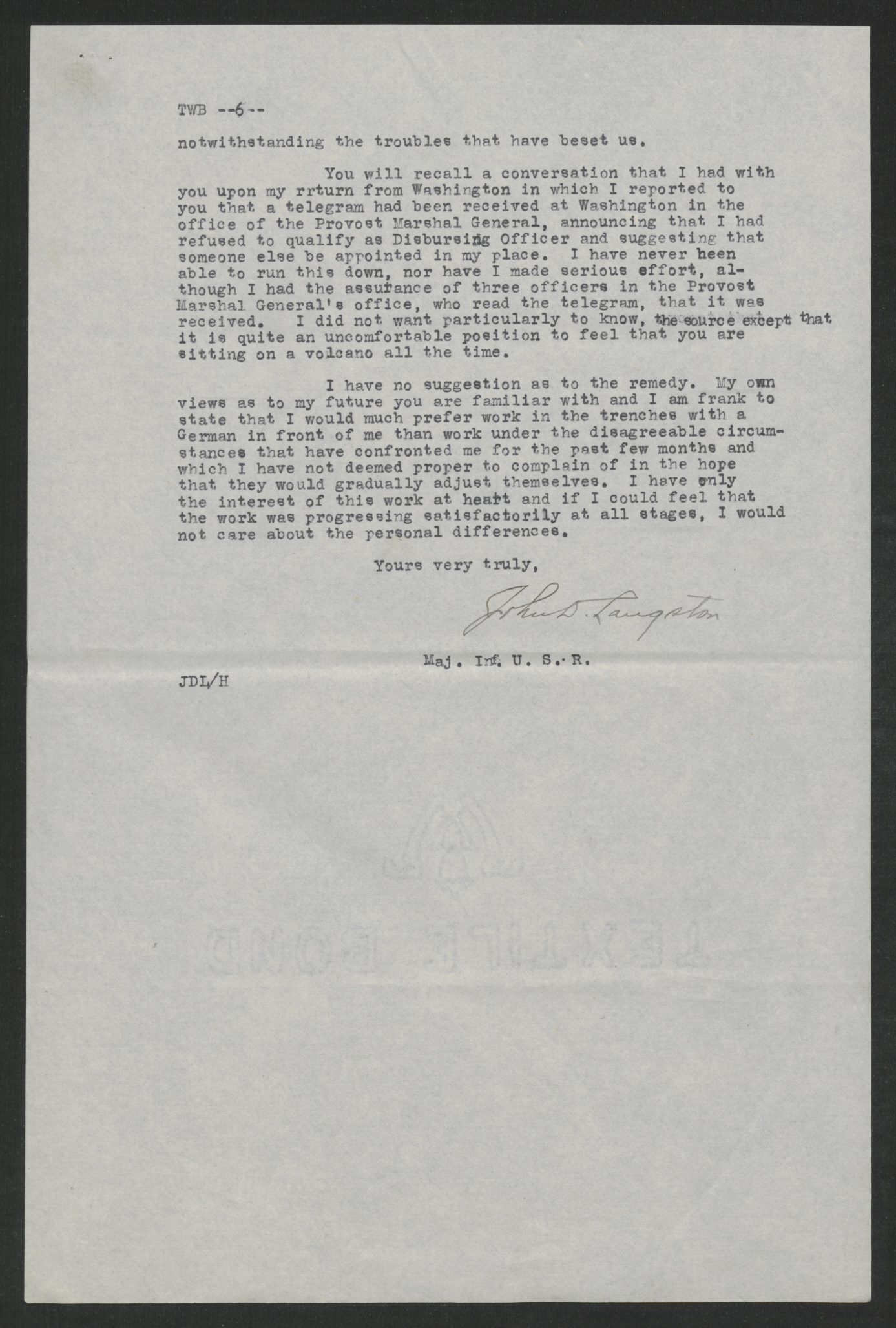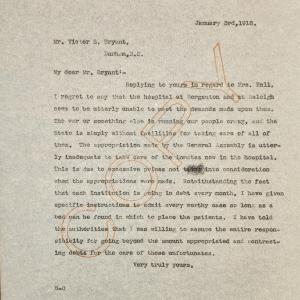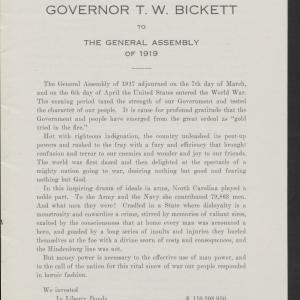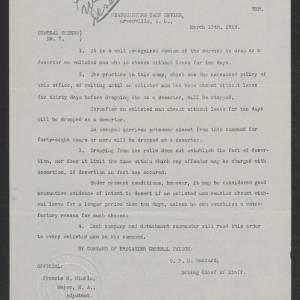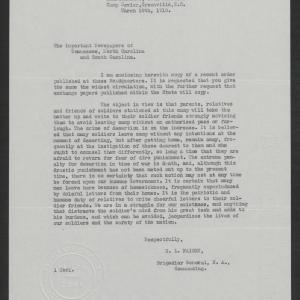File
Special Aide to the Governor
WAR REGISTRATION AND DRAFT
STATE OF NORTH CAROLINA
RALEIGH
May 17th, 1918
Hon. T. W. Bickett,
Governor of North Carolina,
Raleigh, N.C.
My dear Governor:
I have endeavored since being commissioned by the War Department and assignment as Special Aide to you in the administration of the draft work, to give to this work the best that was in me. I have endeavored to do this uncomplainingly in the face of the circumstances that have surrounded me. The work of the Selective Service is, however, such a vital work that it becomes necessary that I acquaint you with the full circumstances under which my work is being performed, in order that you as the chief supervisor of this work for the State of North Carolina, may find a remedy.
You will recall the circumstances under which I was appointed. I was Chairman of the District Board for the Eastern District, carrying what I conceived to have been a proper share of the burden of war work expected to be assumed by any civilian. I was the senior partner of a law firm that controlled perhaps the larger part of the legal practice in my section. Upon your call and assurance that I was perhaps better qualified to perform the duties which I have been performing since December, in your judgment than any other official you had in mind, I willingly laid aside my duties I was then performing as Chairman of the District Board and gladly gave up my law practice in the belief that I could serve better my country in my present capacity. At that time it was anticipated that I might be able to a certain extent divide my time between my official duties and my business. Subsequent events have developed the fact that this could not be done without injury to my official duties, and I have, therefore, discarded my private business until this war is over.
It was your understanding, and mine, and your assurance that my position was not to be a subordinate one, except as it might be subordinate to you as your Special Aide, and that I was to perform my duties unhindered and independent of other officials in the State, except as a proper spirit of cooperation made necessary the working together and advising together with other Departments of this work.
You will recall that when I first took charge of this work there was considerable dissatisfaction on the part of the Adjutant General who had the idea and was expecting that I should serve in a capacity of substantially a clerkship to the Adjutant General, nominally as his assistant, and that the conditions for the first few days of my work here became so unpleasant to the detriment of the work that the matter had to be called to your attention, in order that you might settle the status of my duties and those of the Adjutant General and designate our functions. You will recall that in a conference with the Adjutant General and myself you instructed that the entire draft work be turned over to me. You will recall the manner in which these instructions were received by the Adjutant General, resulting in your remarking to me after the Adjutant General had left your office, that it was a strange thing to you that men who had always been mixed in military affairs were always going around with a chip on their shoulder. You will recall further that a few days after this conference I conferred with you further and advised you that the Adjutant General felt deeply humiliated about the matter, and that in as much as I was unwilling to be a cause of such humiliation that I had conferred with the Adjutant General and had suggested to him that I recognized the position in which it placed him, that I did not care to assume all the duties of the draft work, a part of which had been borne by him theretofore, and in a spirit of cooperation and harmony suggested to him a division of the work. This concession on my part appeared at the time to meet with a hearty response from the Adjutant General, and a division of the work was drawn up, drafted in his office and a typewritten copy furnished him by me, designating the two departments of the draft work specifically, one department being designated “The Adjutant General’s Department” and the other designated “Major Langston’s Department”. A copy of this written agreement between the two departments is hereto attached for your further inspection. You will recall that this agreement of the division of the work was submitted to you be me with the recommendation that it be endorsed by you, which was promptly done, and you stated at the time that you thought that it was a satisfactory solution of the question. You will recall that subsequently when the question arose as to whom the official communications from Washington should be sent, that you were about to issue instructions to Washington to have all official communications addressed through my office, and that foreseeing the resentment that would follow from the Adjutant General’s office and in order to promote harmony, I voluntarily suggested to you that I would prefer that you write the Provost Marshal General to have such official communications forwarded through the office of the Adjutant General. Copy of your letter to the Provost Marshal General on this subject will disclose the fact that this was done at my suggestion. I had expected that this would end the matter and that any feeling of envy or resentment on the part of the Adjutant General would disappear and that a spirit of cooperation would prevail to the end that there be no injury to the administration of the draft law in this State. I regret to say that my hopes were unavailing and that there is and has been throughout the major part of the period since I have been assigned to this work, a total lack of cooperation between the departments, except as such cooperation was voluntarily brought about by one or two of the employees of the Adjutant General’s department who did not appear to have shared the unfortunate spirit of resentment that seems to remain with this otherwise competent official. If the fault is with me, the result is a detriment to the draft, if the fault is elsewhere, the result is the same and in my judgment it becomes your duty, as the chief administrator of the draft in the State, to correct this wherever the axe may fall, It is a condition that the work is confronted with and not a question of individuals. I cannot believe that the fault is with my department. The employees in my department thoroughly understand that they are expected to show the utmost spirit of cooperation with the other departments and to assist in any necessary duties that may arise, and it has been my observation that this proper spirit of cooperation has been maintained by every employee in my department. I cannot believe that the fault is with me personally, as I have lain awake at night trying to devise plans by which a greater spirit of cooperation could prevail. I have made concessions even at the risk of being called weak by my own employees, in the hope that the spirit of concession might meet with a similar spirit to the end that this cooperation might prevail.
The purpose of the Adjutant General to impress the Boards of the State and to impress other officials with whom we have had dealings in connection with the draft, with the idea that my work was a subordinate work, that he was the official in charge of the administration of the draft in this State, has been so apparent throughout the entire period of my work, that it has been to some extent nagging, and yet I have borne with this in the belief that raising the question by public announcement to the Boards would have the effect of accentuating a condition that was already unpleasant; I have even permitted the majority of the Boards in the State to feel that I was an assistant and acting in a subordinate capacity to the Adjutant General, rather than fan the flames.
At a meeting of the Local Boards of the State, and upon my invitation to the Adjutant General to make them a speech, he took advantage of the situation to call their attention in his address to the fact that all matters submitted to the Adjutant General would be given prompt attention, that the work was divided up into various departments, one of which was under Major Langston’s supervision, one under Mr. Malone’s supervision, one under Mr. Mordecai’s supervision and one under Mr. McCargo’s supervision. The only logical conclusion to be reached by the Boards being that Major Langston, together with the other clerks of the Adjutant General’s department, were giving splendid attention to the work that came up before the Adjutant General.
One of the main sources of grievance seems to have been that under the written agreement between the two departments, this office has deemed it necessary to issue a series of bulletins marked “Series” to the Local Boards giving necessary advice upon material matters connected with the work, and to which bulletins this officer’s name has been signed, instead of the Adjutant General’s. It has been the opinion of the Adjutant General that the only communications to the Boards of the State worthy of being issued in bulletin form, were the telegraphic communications from the office of the Provost Marshal General, signed by the Adjutant General. The bulletins that have been issued from this office have been forwarded to the office of the Provost Marshal General and have met with his approval.
There has been a failure in my judgment on the part of the Adjutant General’s office to have the agreement between the two departments carried out in good faith. The matters assigned to each of the departments in this agreement are definitely worded and there can be no misunderstanding and immediately after this agreement was made this office received its proper part of the work and the communications referring to the phases of the work under my department. Of late, however, it is rare indeed that the attention of this office is called by the Adjutant General’s department to any of the important communications coming to his department and which have a direct bearing upon the work assigned to my department. In as much as all the official communications come through the Adjutant General’s department you can thus see that it is impossible for this office to keep up with the duties it should perform. On numbers of occasions this office has been compelled to call upon the office of the Adjutant General for official communications directly relating to the work of this office and carrying instructions which should have been promptly carried out by this department. In one or two instances upon complaint that this office was not receiving certain communications that it should have received, this office was advised by the chief clerk of the Adjutant General’s department that the communications were retained in that department by the instructions of the Adjutant General. In some instances the work which was directly under the supervision of this office has been assumed by the Adjutant General’s department and the communications and the work only turned over to this office after attempt to carry out such work had been made by the Adjutant General’s department. You can see that such a condition as this cannot exist. If this office has supervision of the inspection of Boards, then it is necessary that all communications relating to such inspections shall come to this office unhindered. It is not infrequent for this office to get mail from the Adjutant General’s department that is several days old, when all that is necessary is for such mail to be sent across by messenger boy from the Adjutant General’s department.
So deep is the impression with the Adjutant General that I am subordinate to his office that I am called upon to make reports to him of the work that is done in my department. This I have refused to do, although this department is ready at all times to furnish any information necessary to the Adjutant General’s department, with the expectation that similar reports be furnished to this office.
In the issuance of bulletins this office has relied upon, and by agreement with the Adjutant General in the beginning it was understood that the employees in his department running the mimeographs should issue the bulletins both for his department and for mine, and yet this office is frequently compelled to hold back bulletins necessary to be issued for one or two days at a time, until the employees of the Adjutant General’s department shall reach a leisure moment with nothing else to do. This has been encouraged, in the opinion of this office, by instructions from the Adjutant General, who has been quoted by his employees in response to requests to issue these bulletins, to the effect that they should receive no attention until after such work as he had on hand should be attended to. One of his employees has openly made the statement that she was not concerned in the getting out my bulletins, and this office is not inclined to attribute the blame for this condition to the employee, under the circumstances.
On the day following the Peterson trial the Adjutant General came to my office and stated to me in conversation that he felt he was due me an apopogy, that he was afraid that I had the idea that he had not treated me exactly right, that he had been worried so much and, as he expressed it, “bally-hacked” around so much for the past few months that he had not been himself. I assured the Adjutant General that while I had felt that, that I was glad to let the past be past and that we would get together in a spirit of cooperation and that there would be an end to misunderstandings. I felt better that day than I have felt in six months. For about a week everything ran smoothly, when like the drop of a hat conditions reverted back. It can be sensed in the air.
This condition is thoroughly understood I feel satisfied by all of the employees in both departments, and you can readily understand that regardless of causes a condition that calls the attention of the employees to misunderstandings between the heads of departments is an intolerable condition and causes comment. If I have failed to show at any time during the entire work a proper spirit of cooperation and a desire to assist all of the departments, I would regret it more deeply that anything in my experience. I cannot recall any instance of it, nd I know that there has been no such intention with me.
I believe that you ought to make enquiry into this, in order that if I am wrong I may correct matters or be corrected, and if someone else is wrong, he may correct matters, or be corrected. I believe that you should without reference to the head of either department call in the employees of my department and make enquiry as to my attitude and as to his attitude and the general conduct of the work. I believe that you should further call in before you and make enquiry of the employees of his department as to the relative attitudes of the heads of the two departments. In this way you can arrive to a fair degree at the truth of the situation and I am entirely willing to rely upon your judgment in the matter after such an enquiry.
I have been more deeply chagrined than otherwise about this because of the fact you will recall that immediately prior to the appointment of the Adjutant General as such, I wrote you an urgent letter calling your attention to the fact that the Adjutant General had been mistreated and that I felt that you owed it to him to make such appointment, and that you answered with the suggestion that my views in the matter would be fully met. I have felt that gratitude, if nothing else, should have prompted the Adjutant General to meet me half way in this work and to have even overlooked a few faults, if I had been at fault.
I have no complaint to make as to the competency of the Adjutant General in his department. He has surrounded himself with a corps of valuable assistants who are performing the work splendidly, except as hereinbefore indicated. I feel that I can freely make a statement of what I see the facts to be to you in view of my own record in this work, and I look with some degree of pride upon the fact that it is reported that the State of North Carolina ranks first in efficiency and second in point of economy. I do not take to myself the credit for this improvement. The fact remains, however, that the work has improved to this extent notwithstanding the troubles that have beset us.
You will recall a conversation that I had with you upon my return from Washington in which I reported to you that a telegram had been received at Washington in the office of the Provost Marshal General, announcing that I had refused to qualify as Disbursing Officer and suggesting that someone else be appointed in my place. I have never been able to run this down, nor have I made serious effort, although I had the assurance of three officers in the Provost Marshal General’s office, who read the telegram, that it was received. I did not want particularly to know, the source except that it is quite an uncomfortable position to feel that you are sitting on a volcano all the time.
I have no suggestion as to the remedy. My own views as to my future you are familiar with and I am frank to state that I would much prefer work in the trenches with a German in front of me than work under the disagreeable circumstances that have confronted me for the past few months and which I have not deemed proper to complain of in the hope that they would gradually adjust themselves. I have only the interest of this work at heart and if I could feel that the work was progressing satisfactorily at all stages, I would not care about the personal differences.
Yours very truly,
John D. Langston
Maj. Inf. U. S. R.
JDL/H

